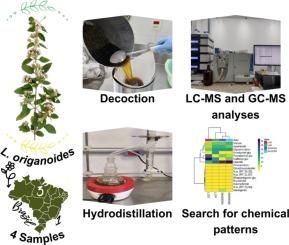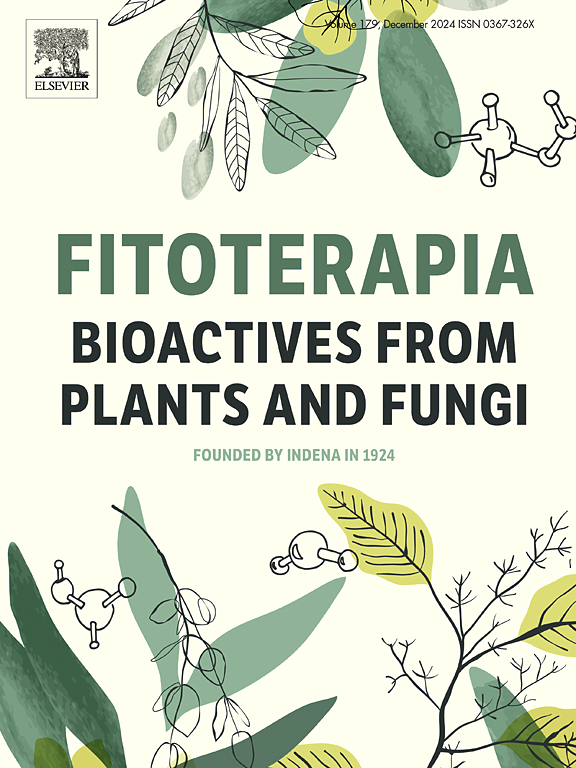丹参(马鞭草科植物)制剂的定性化学特征。
IF 2.5
3区 医学
Q3 CHEMISTRY, MEDICINAL
引用次数: 0
摘要
Lippia origanoides Kunth(LO,马鞭草科)在巴西通常被称为 salva-de-marajó,是一种原产于美洲的芳香植物。奥里克西米纳(巴西帕拉州)的基隆博拉妇女口服或在坐浴中使用麝香芍药煎剂和煎剂蒸气来缓解痛经症状。本研究旨在通过化学定性方法评估萝芙木煎剂和精油。研究人员从两个人身上采集了箭毒草的气生部分,并从公共市场购买了另外两个商业样本。通过煎煮和喷雾干燥获得每个样本的水提取物。喷雾干燥后的煎剂采用 UPLC-APCI(-)-IT-MS2 和聚类热图分析法进行化学表征,以辨别成分模式。精油通过水蒸馏获得,并使用 GC-MS 和 GC-FID 进行分析。共从 LO 煎剂中初步鉴定出 12 种化合物。它们的产物离子谱具有黄酮苷(5 个)和苷(4 个)以及苯丙类化合物的特征,其中包括两个二苯乙烯苷和一个羟基肉桂酸苷。煎剂的化学指纹存在差异,但黄酮苷荭草苷、异荭草苷和牡荆苷成为该物种的潜在标记。样本的精油中含有大量含氧单萜类化合物,主要是对薄荷醇香芹酚(高达 61.9 %)和/或百里酚(高达 17.0 %)以及对伞花烃(高达 24.9 %)。这项研究首次探讨了从萝藦科植物中提取的煎剂的化学成分,凸显了萝藦科植物是一种尚未开发的酚苷来源,而迄今为止对这方面的讨论还很有限。本文章由计算机程序翻译,如有差异,请以英文原文为准。

Qualitative chemical characterization of salva-de-marajó (Lippia origanoides, Verbenaceae) preparations
Lippia origanoides Kunth (LO, Verbenaceae), commonly known in Brazil as salva-de-marajó, is an aromatic plant native to the Americas. Quilombola women from Oriximiná (Pará State, Brazil) use decoctions and decoction vapors of LO aerial parts orally or in sitz baths to alleviate symptoms of dysmenorrhea. This study aimed to evaluate LO decoctions and essential oils through a chemo-qualitative approach. Aerial parts of LO were collected from two individuals, and other two commercial samples were acquired from a public market. Aqueous extract of each sample was obtained by decoction and spray drying. The spray-dried decoctions were chemically characterized using UPLC–APCI(−)–IT–MS2 and cluster heatmap analysis to discern compositional patterns. Essential oils were obtained through hydrodistillation and analyzed using GC–MS and GC–FID. In total, 12 compounds were tentatively identified from LO decoctions. Their product ion spectra were characteristic of flavonoid aglycones (5) and glycosides (4), and phenylpropanoids, including two stilbene glycosides and one hydroxycinnamic acid glycoside. Variations were noted in the chemical fingerprints of the decoctions, but the flavonoid glycosides orientin, isoorientin, and vitexin emerged as potential markers for the species. The essential oils of the samples contained high amounts of oxygenated monoterpenoids, with a predominance of the p-menthanes carvacrol (up to 61.9 %) and/or thymol (up to 17.0 %), and p-cymene (up to 24.9 %). This study was the first to explore the chemical composition of decoctions derived from LO, highlighting the species as an untapped source of phenolic glycosides, an aspect that has received limited discussion thus far.
求助全文
通过发布文献求助,成功后即可免费获取论文全文。
去求助
来源期刊

Fitoterapia
医学-药学
CiteScore
5.80
自引率
2.90%
发文量
198
审稿时长
1.5 months
期刊介绍:
Fitoterapia is a Journal dedicated to medicinal plants and to bioactive natural products of plant origin. It publishes original contributions in seven major areas:
1. Characterization of active ingredients of medicinal plants
2. Development of standardization method for bioactive plant extracts and natural products
3. Identification of bioactivity in plant extracts
4. Identification of targets and mechanism of activity of plant extracts
5. Production and genomic characterization of medicinal plants biomass
6. Chemistry and biochemistry of bioactive natural products of plant origin
7. Critical reviews of the historical, clinical and legal status of medicinal plants, and accounts on topical issues.
 求助内容:
求助内容: 应助结果提醒方式:
应助结果提醒方式:


